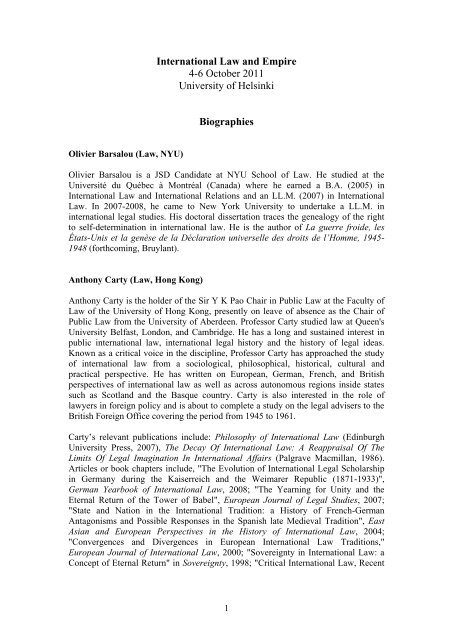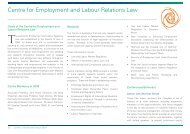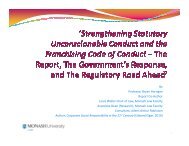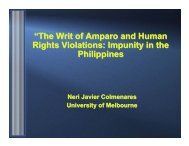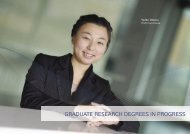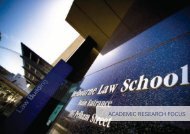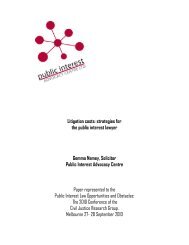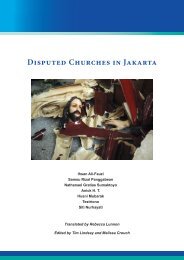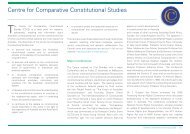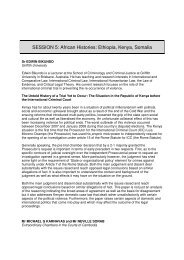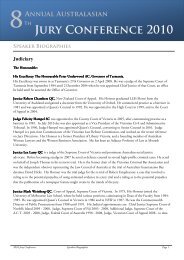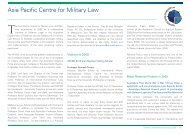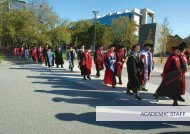Property and Empire - University of Melbourne
Property and Empire - University of Melbourne
Property and Empire - University of Melbourne
You also want an ePaper? Increase the reach of your titles
YUMPU automatically turns print PDFs into web optimized ePapers that Google loves.
International Law <strong>and</strong> <strong>Empire</strong><br />
4-6 October 2011<br />
<strong>University</strong> <strong>of</strong> Helsinki<br />
Biographies<br />
Olivier Barsalou (Law, NYU)<br />
Olivier Barsalou is a JSD C<strong>and</strong>idate at NYU School <strong>of</strong> Law. He studied at the<br />
Université du Québec à Montréal (Canada) where he earned a B.A. (2005) in<br />
International Law <strong>and</strong> International Relations <strong>and</strong> an LL.M. (2007) in International<br />
Law. In 2007-2008, he came to New York <strong>University</strong> to undertake a LL.M. in<br />
international legal studies. His doctoral dissertation traces the genealogy <strong>of</strong> the right<br />
to self-determination in international law. He is the author <strong>of</strong> La guerre froide, les<br />
États-Unis et la genèse de la Déclaration universelle des droits de l’Homme, 1945-<br />
1948 (forthcoming, Bruylant).<br />
Anthony Carty (Law, Hong Kong)<br />
Anthony Carty is the holder <strong>of</strong> the Sir Y K Pao Chair in Public Law at the Faculty <strong>of</strong><br />
Law <strong>of</strong> the <strong>University</strong> <strong>of</strong> Hong Kong, presently on leave <strong>of</strong> absence as the Chair <strong>of</strong><br />
Public Law from the <strong>University</strong> <strong>of</strong> Aberdeen. Pr<strong>of</strong>essor Carty studied law at Queen's<br />
<strong>University</strong> Belfast, London, <strong>and</strong> Cambridge. He has a long <strong>and</strong> sustained interest in<br />
public international law, international legal history <strong>and</strong> the history <strong>of</strong> legal ideas.<br />
Known as a critical voice in the discipline, Pr<strong>of</strong>essor Carty has approached the study<br />
<strong>of</strong> international law from a sociological, philosophical, historical, cultural <strong>and</strong><br />
practical perspective. He has written on European, German, French, <strong>and</strong> British<br />
perspectives <strong>of</strong> international law as well as across autonomous regions inside states<br />
such as Scotl<strong>and</strong> <strong>and</strong> the Basque country. Carty is also interested in the role <strong>of</strong><br />
lawyers in foreign policy <strong>and</strong> is about to complete a study on the legal advisers to the<br />
British Foreign Office covering the period from 1945 to 1961.<br />
Carty‟s relevant publications include: Philosophy <strong>of</strong> International Law (Edinburgh<br />
<strong>University</strong> Press, 2007), The Decay Of International Law: A Reappraisal Of The<br />
Limits Of Legal Imagination In International Affairs (Palgrave Macmillan, 1986).<br />
Articles or book chapters include, "The Evolution <strong>of</strong> International Legal Scholarship<br />
in Germany during the Kaiserreich <strong>and</strong> the Weimarer Republic (1871-1933)",<br />
German Yearbook <strong>of</strong> International Law, 2008; "The Yearning for Unity <strong>and</strong> the<br />
Eternal Return <strong>of</strong> the Tower <strong>of</strong> Babel", European Journal <strong>of</strong> Legal Studies, 2007;<br />
"State <strong>and</strong> Nation in the International Tradition: a History <strong>of</strong> French-German<br />
Antagonisms <strong>and</strong> Possible Responses in the Spanish late Medieval Tradition", East<br />
Asian <strong>and</strong> European Perspectives in the History <strong>of</strong> International Law, 2004;<br />
"Convergences <strong>and</strong> Divergences in European International Law Traditions,"<br />
European Journal <strong>of</strong> International Law, 2000; "Sovereignty in International Law: a<br />
Concept <strong>of</strong> Eternal Return" in Sovereignty, 1998; "Critical International Law, Recent<br />
1
Trends in the Theory <strong>of</strong> International Law", European Journal <strong>of</strong> International Law,<br />
1991.<br />
Ayça Çubukçu (Social Studies, Harvard <strong>University</strong>)<br />
Ayça Çubukçu teaches on the history <strong>of</strong> social <strong>and</strong> political theory, human rights, <strong>and</strong><br />
international law as a Lecturer on Social Studies at Harvard <strong>University</strong>. Previously,<br />
she was a Max Weber Fellow at the European <strong>University</strong> Institute in Florence (2009-<br />
2010), <strong>and</strong> a Postdoctoral Scholar with the Committee on Global Thought at<br />
Columbia <strong>University</strong> (2007-2009), where she designed <strong>and</strong> taught a graduate level<br />
seminar, “The Law <strong>of</strong> Violence.” Çubukçu's publications include "On Cosmopolitan<br />
Occupations: the Case <strong>of</strong> the World Tribunal on Iraq" in Interventions: International<br />
Journal <strong>of</strong> Postcolonial Studies (2011), <strong>and</strong> "Few Prime Fragments for a Radical<br />
Title" in the journal <strong>of</strong> critical theory <strong>and</strong> philosophy, Parallax (2010). Her book<br />
manuscript, "Humanity Must Be Defended": Paradoxes <strong>of</strong> A Democratic Desire, is<br />
currently under revision. Ayça Çubukçu holds a Ph.D. with Distinction (2008) from<br />
the Department <strong>of</strong> Anthropology at Columbia <strong>University</strong> <strong>and</strong> a B.A. in Government<br />
with Distinction in All Subjects (2001) from Cornell <strong>University</strong>.<br />
Ignacio de la Rasilla (Law, European <strong>University</strong> Institute)<br />
Dr Ignacio de la Rasilla del Moral is a Post-Doctoral Max Weber Fellow in Law in<br />
2011 at European <strong>University</strong> Institute in Florence where he also collaborates with the<br />
EUI‟s Global Governance Program. He holds degrees from Harvard Law School<br />
(LLM) the Graduate Institute <strong>of</strong> International <strong>and</strong> Development Studies (MA & PhD)<br />
<strong>and</strong> <strong>University</strong> Complutense <strong>of</strong> Madrid (LLB). He has held positions as Fellow in<br />
Global Governance, Law <strong>and</strong> Social Thought <strong>and</strong> Visiting Scholar in International<br />
Studies at the Watson Institute for International Studies at Brown <strong>University</strong> as well<br />
as Fellow <strong>of</strong> the Royal Complutense College at Harvard <strong>University</strong> <strong>and</strong> Summer<br />
Academic Fellow <strong>of</strong> Harvard Law School. He has been Visiting Researcher at the<br />
Institute for Global Law <strong>and</strong> Policy <strong>and</strong> the European Law Research Center both at<br />
Harvard. He is a Research Associate <strong>of</strong> the Centre for the Study <strong>and</strong> Research <strong>of</strong><br />
International Law (CERDIN) at the <strong>University</strong> Paris I (Pantheon-Sorbonne) <strong>and</strong><br />
member <strong>of</strong> the Spanish History <strong>of</strong> International Law Research project <strong>of</strong> the Spanish<br />
Ministry <strong>of</strong> Innovation <strong>and</strong> Science <strong>and</strong> the <strong>University</strong> <strong>of</strong> Zaragoza.<br />
Adriana Di Stefano (Law, Catania)<br />
Adriana Di Stefano is a tenured researcher in international law at the <strong>University</strong> <strong>of</strong><br />
Catania Law School. Lawyer in Italy, research fellow in International Human Rights<br />
Law <strong>and</strong> IHL <strong>and</strong> senior lecturer in European Union Law, since 2003 she has been<br />
working as teaching <strong>and</strong> research assistant at the Centre <strong>of</strong> Research on International<br />
Organizations, CRIO Workshop, <strong>University</strong> <strong>of</strong> Catania (main research topic on<br />
occupied territories‟ administration, international organization <strong>and</strong> HRL). Dr Di<br />
Stefano graduated in Law cum laude at the same <strong>University</strong> (2001) <strong>and</strong> obtained a<br />
Ph.D. in Political Philosophy <strong>and</strong> Human Rights from the Faculty <strong>of</strong> Political<br />
Sciences (2005). From 2002 to 2009 she has been involved in research activities in<br />
2
human rights law <strong>and</strong> international humanitarian law in Florence, Geneva, Castellon,<br />
Valencia, Paris, The Hague, Dakar, Boston, Amsterdam (ACIL 2009 fall semester<br />
visiting scholar, research project on “The Relationship between Human Rights<br />
Regimes <strong>and</strong> Belligerent Occupation. The Case <strong>of</strong> Iraq”), Tel Aviv (2010 spring term<br />
visiting fellow at the Cegla Center <strong>of</strong> TAU, research program focusing on<br />
effectiveness <strong>of</strong> local remedies <strong>and</strong> denial <strong>of</strong> justice in the context <strong>of</strong> military<br />
occupation regimes <strong>and</strong> <strong>of</strong> post-conflict UN-led transitions). She is currently<br />
finalizing a research project on the effectiveness <strong>of</strong> local remedies in international<br />
human rights regimes.<br />
Maria Drakopoulou (Law, Kent)<br />
Maria Drakopoulou, a Reader in Law at Kent Law School (KLS), the <strong>University</strong> <strong>of</strong><br />
Kent, UK, became an academic after practicing for eleven years as a criminal barrister<br />
in Athens, Greece. She has held research fellowships at the European <strong>University</strong><br />
Institute in Florence <strong>and</strong> at Griffith/Queensl<strong>and</strong> Law Schools, Brisbane (2003, 2009),<br />
<strong>and</strong> attended the <strong>University</strong> <strong>of</strong> Helsinki Law School in 2005 as academic invitee.<br />
She acts as an external reviewer for the Law Department group <strong>of</strong> the Centre for<br />
Gender Studies at the <strong>University</strong> <strong>of</strong> Umeå, Sweden, is a founding member <strong>and</strong><br />
editorial group member <strong>of</strong> the journal Feminist Legal Studies, for which she has<br />
performed various roles, <strong>and</strong> is currently the Director <strong>of</strong> Postgraduate Research at<br />
KLS. Her main areas <strong>of</strong> research interest are Feminist Theory <strong>and</strong> Jurisprudence,<br />
Legal Theory <strong>and</strong> Philosophy, Roman Law <strong>and</strong> Legal History. She is currently<br />
working on a book on the genealogy <strong>of</strong> feminist critique in law.<br />
Luis Eslava (Law, <strong>Melbourne</strong>)<br />
Luis Eslava is a Senior Fellow (<strong>Melbourne</strong> Law Masters) <strong>and</strong> PhD C<strong>and</strong>idate at the<br />
Institute for International Law <strong>and</strong> the Humanities, <strong>Melbourne</strong> Law School. During<br />
2011-2012, Luis is a Visiting Research Fellow at the Max Planck Institute for<br />
Comparative Public Law <strong>and</strong> International Law in Heidelberg, Germany. His research<br />
interests are located at the intersection between International Law, Development <strong>and</strong><br />
Global Governance. In particular, his fieldwork <strong>and</strong> writing explore the<br />
anthropological, political <strong>and</strong> economic dimensions <strong>of</strong> today‟s international normative<br />
project <strong>and</strong> the lived experience <strong>of</strong> development in the Third World.<br />
Mónica Garcia-Salmones (Law, Helsinki)<br />
Mónica García-Salmones is a Research Fellow at the Erik Castrén <strong>of</strong> International<br />
Law <strong>and</strong> Human Rights. She is now finalising her doctoral dissertation on the history<br />
<strong>of</strong> positivist international law. Her research interests include international legal<br />
theories, positivism (Thomas Hobbes <strong>and</strong> Hans Kelsen), economic-positivism, legal<br />
philosophy, <strong>and</strong> 19th <strong>and</strong> 20th century history <strong>of</strong> international law. Together with<br />
Luis Eslava, she contributed to the last volume <strong>of</strong> the Select Proceedings <strong>of</strong> the<br />
European Society <strong>of</strong> International Law (2010) with an article entitled „Jurisdictional<br />
Colonization in the Spanish <strong>and</strong> British <strong>Empire</strong>s: Some Reflections on a Global<br />
Public Order <strong>and</strong> the Sacred‟.<br />
3
Marcus Gunneflo (Law, Lund)<br />
Markus Gunneflo is a PhD c<strong>and</strong>idate at the Faculty <strong>of</strong> Law, Lund <strong>University</strong>,<br />
Sweden. He is writing his doctoral dissertation about American <strong>and</strong> Israeli targeted<br />
killings touching upon aspects <strong>of</strong> international law such as human rights <strong>and</strong><br />
humanitarian law as well as legal <strong>and</strong> political theory.<br />
Stephen Hopgood (International Relations, SOAS)<br />
Dr Stephen Hopgood is Reader in International Relations at the School <strong>of</strong> Oriental<br />
<strong>and</strong> African Studies, <strong>University</strong> <strong>of</strong> London <strong>and</strong> co-Director <strong>of</strong> the Centre for the<br />
International Politics <strong>of</strong> Conflict, Rights <strong>and</strong> Justice (CCRJ) at SOAS. His<br />
publications include Keepers <strong>of</strong> the Flame: Underst<strong>and</strong>ing Amnesty International<br />
(Cornell <strong>University</strong> Press, 2006), „Saying „no‟ to Wal-Mart? Money <strong>and</strong> morality in<br />
pr<strong>of</strong>essional humanitarianism‟, chapter in Michael Barnett <strong>and</strong> Thomas G Weiss<br />
(eds.) Humanitarianism in Question: Politics, Power, Ethics (Ithaca: Cornell<br />
<strong>University</strong> Press, 2008), <strong>and</strong> „Moral authority, modernity <strong>and</strong> the politics <strong>of</strong> the<br />
sacred,‟ European Journal <strong>of</strong> International Relations, 15/2, 2009. He is currently the<br />
holder <strong>of</strong> a Leverhulme Major Research Fellowship under the title „<strong>Empire</strong> <strong>of</strong> the<br />
International‟.<br />
Martti Koskenniemi (Law, Helsinki)<br />
Martti Koskenniemi is Academy Pr<strong>of</strong>essor (2012-2016) with the <strong>University</strong> <strong>of</strong><br />
Helsinki <strong>and</strong> Arthur Goodhart Pr<strong>of</strong>essor <strong>of</strong> Legal Science, <strong>University</strong> <strong>of</strong> Cambridge<br />
(2008-2009). He is also Hauser Global Pr<strong>of</strong>essor <strong>of</strong> law at New York <strong>University</strong><br />
School <strong>of</strong> Law. He has been a member <strong>of</strong> the UN International Law Commission<br />
(2002-2006) <strong>and</strong> Judge at the Administrative Tribunal <strong>of</strong> the Asian Development<br />
Bank (1997-2002). In 1978-1994 he was a member <strong>of</strong> the Finnish Ministry for<br />
Foreign Affairs. He is Counsellor <strong>of</strong> the American Society <strong>of</strong> International Law <strong>and</strong><br />
member <strong>of</strong> the Institut de droit international.<br />
Philip Lorenz (English, Cornell)<br />
Philip Lorenz received his Ph.D. from New York <strong>University</strong>. Before joining the<br />
English department at Cornell, he was a Bradley Visiting Assistant Pr<strong>of</strong>essor in<br />
the Honors College at the <strong>University</strong> <strong>of</strong> Wisconsin-Milwaukee. His research focuses<br />
primarily on English <strong>and</strong> Spanish literature <strong>and</strong> drama <strong>of</strong> the sixteenth <strong>and</strong><br />
seventeenth centuries, <strong>and</strong> his areas <strong>of</strong> interest include Theories <strong>of</strong> Sovereignty,<br />
Political Theology, Psychoanalysis, Poetics <strong>and</strong> Theory, <strong>and</strong> Philosophy. He is<br />
currently completing his first book, The Tears <strong>of</strong> Sovereignty: Perspectives <strong>of</strong> Power<br />
in Renaissance Drama (under contract with Fordham <strong>University</strong> Press).<br />
4
Alej<strong>and</strong>ro Lorite Escorihuela (Helsinki Collegium for Advanced Studies)<br />
Alej<strong>and</strong>ro Lorite Escorihuela is currently a Fellow at the Helsinki Collegium for<br />
Advanced Studies, on a project entitled "The Global Governance <strong>of</strong> Animal Death".<br />
He has taught international law courses at the American <strong>University</strong> in Cairo, the<br />
<strong>University</strong> <strong>of</strong> Helsinki, Sciences Po Paris, Addis Ababa <strong>University</strong>, the Université du<br />
Québec in Montréal, Tufts <strong>University</strong> <strong>and</strong> Br<strong>and</strong>eis <strong>University</strong>. He studied at the<br />
<strong>University</strong> <strong>of</strong> Geneva, the Graduate Institute <strong>of</strong> International Studies, <strong>and</strong> Harvard<br />
Law School.<br />
Doreen Lustig (Law, NYU)<br />
Doreen Lustig is a JSD C<strong>and</strong>idate <strong>and</strong> IILJ Graduate Scholar at NYU Law School.<br />
She received the Andrew W. Mellon Fellowship from the History Department at<br />
Columbia <strong>University</strong> this year <strong>and</strong> will be a Cegla fellow at Tel Aviv <strong>University</strong> in<br />
the academic year <strong>of</strong> 2011-2012. Ms. Lustig completed her LLM in the LLM-JSD<br />
program <strong>of</strong> International Legal Studies as a Hauser scholar in 2006. She received<br />
both her LLB <strong>and</strong> a Bachelor's degree in Sociology <strong>and</strong> Anthropology from Tel Aviv<br />
<strong>University</strong>. Subsequent to her Bachelor's studies she was employed as a legal clerk for<br />
Justice Eliezer Rivlin at the Israeli Supreme Court. Her research areas are the history<br />
<strong>and</strong> theory <strong>of</strong> international law, <strong>and</strong> more broadly political <strong>and</strong> legal theory. Her<br />
dissertation, The Business <strong>of</strong> International Law: International Legal Attitudes to the<br />
Corporate Entity 1870-1954, traces the history <strong>and</strong> theory <strong>of</strong> the business enterprise<br />
in international law.<br />
Robert Murtfeld (Law, SOAS)<br />
Robert Murtfeld currently pursues a PhD thesis under the supervision <strong>of</strong> Matthew<br />
Craven at the School <strong>of</strong> Oriental <strong>and</strong> African Studies (SOAS), <strong>University</strong> <strong>of</strong> London.<br />
He co-founded at the faculty <strong>of</strong> law the Centre for the Study <strong>of</strong> Colonialism, <strong>Empire</strong><br />
<strong>and</strong> International Law <strong>and</strong> he taught for three years on the associated LLM course. He<br />
presented his work on the Herero/Lemkin nexus prior at the British Branch <strong>of</strong> the<br />
International Law Association as well as the Imperial War Museum in London. He<br />
also conducted archival research on Lemkin in New York when a visiting research<br />
fellow at Columbia <strong>University</strong> with the sponsorship by Jose Alvarez. He has received<br />
an <strong>of</strong>fer to publish his work in the Leiden Journal <strong>of</strong> International Law. He has<br />
exp<strong>and</strong>ed his research on imperialism from the Herero to the case <strong>of</strong> the Mau Mau<br />
(which is currently pursued against the British Foreign <strong>and</strong> Commonwealth Office)<br />
<strong>and</strong> he presented next to the historian <strong>and</strong> expert witness David Anderson on the<br />
subject. He is currently re-channelling his research into a new career path in<br />
international criminal law <strong>and</strong> at international criminal tribunals. His thesis is<br />
accordingly re-written for submission in 2012/13 <strong>and</strong> it will carry the title: "Who Are<br />
We to Judge? International Justice <strong>and</strong> the Imperial Predicament". He also organised<br />
an associated event with Martti Koskenniemi <strong>and</strong> Jacques Verges on "International<br />
Justice: Between Impunity <strong>and</strong> Show Trials" <strong>and</strong> he was <strong>of</strong>fered most recently to<br />
work as an assistant for the defence team in the case <strong>of</strong> the Prosecutor v Kenyatta,<br />
Muthaura <strong>and</strong> Ali at the ICC.<br />
5
Vasuki Nesiah (Galatin, NYU)<br />
Vasuki Nesiah is Associate Pr<strong>of</strong>essor <strong>of</strong> Practice at the Gallatin School in New York<br />
<strong>University</strong> where she teaches human rights, law <strong>and</strong> social theory <strong>and</strong> international<br />
legal studies. Currently her main areas <strong>of</strong> research include the law <strong>and</strong> politics <strong>of</strong><br />
international human rights <strong>and</strong> humanitarianism, with a particular focus on<br />
transitional justice. Her past publications have engaged with different dimensions <strong>of</strong><br />
public international law, legal history focused on colonialism <strong>and</strong> self-determination,<br />
the politics <strong>of</strong> memory, comparative constitutionalism, law <strong>and</strong> politics in South Asia<br />
<strong>and</strong> international feminisms. Before entering the academy full time, Nesiah spent<br />
several years in practice at the International Center for Transitional Justice (ICTJ)<br />
where she worked on law <strong>and</strong> policy issues in the field <strong>of</strong> post-conflict human rights.<br />
Gregor Noll (Law, Lund)<br />
Since 2006, Pr<strong>of</strong>essor Gregor Noll holds the chair <strong>of</strong> international law at the Faculty<br />
<strong>of</strong> Law, Lund <strong>University</strong>, Sweden. His current research is on refugee <strong>and</strong> migration<br />
law, the theory <strong>of</strong> international law <strong>and</strong> the use <strong>of</strong> force. Until September 2002, he<br />
served as Research Director <strong>and</strong> Deputy Director General at the Danish Centre for<br />
Human Rights, Copenhagen, Denmark. Noll was the editor in chief <strong>of</strong> the Nordic<br />
Journal <strong>of</strong> International Law (2000-2006). He is a member <strong>of</strong> the editorial board <strong>of</strong><br />
NJIL as well as <strong>of</strong> the advisory board <strong>of</strong> the Journal <strong>of</strong> Refugee Studies. Currently,<br />
Gregor Noll is pursuing two larger projects: 1) A Heideggerian Reading <strong>of</strong> the<br />
Concept <strong>of</strong> Jurisdiction in Human Rights Law; <strong>and</strong> 2) The Impact <strong>of</strong> Military<br />
Training Practices on Targeting Norms in IHL.<br />
Luigi Nuzzo (Law, Lecce)<br />
Luigi Nuzzo is Pr<strong>of</strong>essor <strong>of</strong> Legal History at the Law Faculty, <strong>University</strong> <strong>of</strong> Salento,<br />
where he teaches History <strong>of</strong> Medieval <strong>and</strong> Modern Law <strong>and</strong> History <strong>of</strong> International<br />
Law. He graduated from the <strong>University</strong> <strong>of</strong> Pavia, has received a PhD on History <strong>of</strong><br />
Italian Law from the <strong>University</strong> <strong>of</strong> Siena <strong>and</strong> has carried on scientific <strong>and</strong> didactic<br />
activities at the Universities "La Sapienza" <strong>of</strong> Rome <strong>and</strong> "Federico II" <strong>of</strong> Naples.<br />
Fellow at the Max-Planck-Institut für europäische Rechtsgeschichte, has carried out<br />
research at the <strong>University</strong> <strong>of</strong> Barcelona, Seville, Madrid, Mexico City, Havana. He<br />
has been Robbins Research Fellow <strong>of</strong> the <strong>University</strong> California at Berkeley <strong>and</strong><br />
Alex<strong>and</strong>er von Humboldt Forschungstipendiat. He is the coordinator <strong>of</strong> an<br />
international project founded by Italian <strong>University</strong> Ministry on Right <strong>of</strong> memory <strong>and</strong><br />
Indigenous Populations. His research interests concern: the history <strong>of</strong> international<br />
law, the colonial law, the ius commune <strong>and</strong> the legal culture <strong>of</strong> the nineteenth century.<br />
Liliana Obregón (Law, Bogotá/Helsinki)<br />
Liliana Obregón is Associate Pr<strong>of</strong>essor <strong>of</strong> Law (on leave) <strong>and</strong> former Director <strong>of</strong> the<br />
International Law Program at the <strong>University</strong> <strong>of</strong> Los Andes in Bogotá, Colombia.<br />
Pr<strong>of</strong>essor Obregón obtained her doctoral degree from Harvard Law School where she<br />
6
specialized in the history <strong>and</strong> theory <strong>of</strong> international law <strong>and</strong> international institutions,<br />
with particular interest in the study <strong>of</strong> Latin American regionalist perspectives. She<br />
also holds an MA in International Affairs from the School <strong>of</strong> Advanced International<br />
Studies (SAIS) <strong>of</strong> the Johns Hopkins <strong>University</strong> where she concentrated in Latin<br />
American Studies. Representative publications include „Between Civilization <strong>and</strong><br />
Barbarism: Creole Interventions in International Law‟ in Richard Falk, Balakrishnan<br />
Rajagopal <strong>and</strong> Jacqueline Stevens (eds), International Law <strong>and</strong> the Third World:<br />
Reshaping Justice, Routledge-Cavendish, (2008); „Noted for Dissent: The<br />
International Life <strong>of</strong> Alej<strong>and</strong>ro Alvarez‟, special edition <strong>of</strong> the Leiden Journal <strong>of</strong><br />
International Law, volume 19, No. 4 (2006); „Creole Consciousness <strong>and</strong> International<br />
Law in Nineteenth Century Latin America; in Anne Orford (ed), International Law<br />
<strong>and</strong> Its Others, Cambridge <strong>University</strong> Press (2006), <strong>and</strong> „In Search <strong>of</strong> Hope: the<br />
Plight <strong>of</strong> Displaced Colombians‟ in Roberta Cohen <strong>and</strong> Francis Deng (eds), The<br />
Forsaken People, The Brookings Institution, Washington D.C. (1998).<br />
Anne Orford (Law, <strong>Melbourne</strong>)<br />
Anne Orford is the holder <strong>of</strong> the Michael D Kirby Chair <strong>of</strong> International Law, an<br />
Australian Research Council Pr<strong>of</strong>essorial Fellow (2007-2011), <strong>and</strong> foundation<br />
Director <strong>of</strong> the Institute for International Law <strong>and</strong> the Humanities at <strong>Melbourne</strong> Law<br />
School. She researches in the fields <strong>of</strong> international law <strong>and</strong> legal theory. Her work<br />
explores the nature <strong>of</strong> international law <strong>and</strong> its relationship to histories <strong>of</strong> empire, the<br />
modern state, counter-revolution, the use <strong>of</strong> force, the management <strong>of</strong> decolonisation,<br />
uneven development, <strong>and</strong> the expansion <strong>of</strong> international administration. Her major<br />
publications include International Authority <strong>and</strong> the Responsibility to Protect (CUP,<br />
2011), the edited collection International Law <strong>and</strong> its Others (CUP, 2006), <strong>and</strong><br />
Reading Humanitarian Intervention: Human Rights <strong>and</strong> the Use <strong>of</strong> Force in<br />
International Law (CUP, 2003). During 2011, Anne is the Torgny Segerstedts<br />
Visiting Pr<strong>of</strong>essor at the <strong>University</strong> <strong>of</strong> Gothenburg <strong>and</strong> a Visiting Pr<strong>of</strong>essor at Lund<br />
<strong>University</strong>. She is currently working on two major projects – a commissioned book on<br />
International Legal Theory <strong>and</strong> a monograph entitled From Famine to Food Security:<br />
The Practical History <strong>of</strong> an International Project.<br />
Umut Özsu (Law, Toronto)<br />
Umut Özsu is an assistant pr<strong>of</strong>essor at the <strong>University</strong> <strong>of</strong> Manitoba Faculty <strong>of</strong> Law.<br />
His interests lie principally in public international law, history <strong>and</strong> theory <strong>of</strong><br />
international law, comparative legal studies, sociology <strong>of</strong> law, <strong>and</strong> critical legal<br />
theory. He is currently interested in the international legal implications <strong>of</strong> nationbuilding<br />
<strong>and</strong> humanitarian intervention, a particular source <strong>of</strong> concern being the<br />
(relatively under-examined) experiences <strong>of</strong> states <strong>and</strong> regions on the “semi-periphery”<br />
<strong>of</strong> the international legal order. He also maintains a strong research interest in legal<br />
<strong>and</strong> political theories <strong>of</strong> state sovereignty. His doctoral dissertation, defended in June<br />
2011 at the <strong>University</strong> <strong>of</strong> Toronto, concerned a crucial episode in the international<br />
legal history <strong>of</strong> nation-building – the post-First World War Greek-Turkish population<br />
exchange.<br />
7
Sundhya Pahuja (Law, <strong>Melbourne</strong>)<br />
Writing, researching <strong>and</strong> teaching in the areas <strong>of</strong> law <strong>and</strong> development, international<br />
law, law <strong>and</strong> globalisation <strong>and</strong> legal theory, Sundhya's scholarship is broadly<br />
concerned with the changing role <strong>of</strong> law <strong>and</strong> legal institutions in the context <strong>of</strong><br />
development <strong>and</strong> globalisation. It engages with the practice, <strong>and</strong> praxis, <strong>of</strong><br />
international law <strong>and</strong> development through political philosophy, political-economy<br />
<strong>and</strong> postcolonial theories. Recent works include Events: The Force <strong>of</strong> International<br />
Law (Routledge, 2010) (co-edited with Fleur Johns <strong>and</strong> Richard Joyce). Her research<br />
on the politics <strong>of</strong> contemporary international institutions – both political <strong>and</strong><br />
economic – <strong>and</strong> the concept <strong>of</strong> the universal, is forthcoming as Decolonising<br />
International Law: Development, Economic Growth <strong>and</strong> the Politics <strong>of</strong> Universality,<br />
to be published by Cambridge <strong>University</strong> Press in 2011. Sundhya is currently writing<br />
a book on International Development as part <strong>of</strong> the Routledge-Cavendish Critical<br />
Approaches to Law series <strong>and</strong> also researching issues relating to international law <strong>and</strong><br />
poverty <strong>and</strong> to the global commons.<br />
Sundhya is concurrently a Visiting Research Fellow at Birkbeck, <strong>University</strong> <strong>of</strong><br />
London, <strong>and</strong> has held visiting appointments at the London School <strong>of</strong> Economics <strong>and</strong><br />
Political Science, New York <strong>University</strong>, Birkbeck <strong>and</strong> the <strong>University</strong> <strong>of</strong> British<br />
Columbia. She is currently a member <strong>of</strong> the organising committee <strong>of</strong> the Legal<br />
Theory Interest group <strong>of</strong> the European Society <strong>of</strong> International Law <strong>and</strong> serves on the<br />
editorial boards <strong>of</strong> the Australian Feminist Law Journal <strong>and</strong> the Law, Social Justice<br />
<strong>and</strong> Global Development Journal (LGD) based at the <strong>University</strong> <strong>of</strong> Warwick.<br />
Rose Parfitt (Law, SOAS)<br />
Dr Rose Sydney Parfitt is an Assistant Pr<strong>of</strong>essor <strong>of</strong> International Law at the American<br />
<strong>University</strong> in Cairo, in the Department <strong>of</strong> Political Science. She received her<br />
doctorate in December 2010 from Department <strong>of</strong> Law at the School <strong>of</strong> Oriental <strong>and</strong><br />
African Studies (SOAS) in London. Her thesis examined the concept <strong>of</strong> international<br />
personality through two lenses: one historical (the annexation <strong>of</strong> the Ethiopian <strong>Empire</strong><br />
by Fascist Italy in 1935-36); the other theoretical (Mikhail Bakhtin's concept <strong>of</strong><br />
dialogical meaning). Her current research looks into the concept <strong>of</strong> freedom as<br />
habitually attached, rhetorically <strong>and</strong> legally, to the related concepts <strong>of</strong> slavery <strong>and</strong> <strong>of</strong><br />
the market. She has co-taught courses on critical approaches to international law<br />
<strong>and</strong>/or law-<strong>and</strong>-development at SOAS <strong>and</strong> at the London School <strong>of</strong> Economics.<br />
Jennifer Pitts (History, Chicago)<br />
Jennifer Pitts is Associate Pr<strong>of</strong>essor <strong>of</strong> Political Science at the <strong>University</strong> <strong>of</strong> Chicago.<br />
She is author <strong>of</strong> A Turn to <strong>Empire</strong>: the rise <strong>of</strong> imperial liberalism in Britain <strong>and</strong><br />
France (Princeton, 2005) <strong>and</strong> editor <strong>and</strong> translator <strong>of</strong> Alexis de Tocqueville: writings<br />
on empire <strong>and</strong> slavery (Johns Hopkins, 2001). Recent articles include a review essay<br />
on the past decade's work in political theory <strong>and</strong> empire for the Annual Review <strong>of</strong><br />
Political Science (2010), "Hobson's Imperialism: A Reconsideration" (Raritan, 2010),<br />
<strong>and</strong> a forthcoming essay, "<strong>Empire</strong> <strong>and</strong> Legal Pluralisms in the Eighteenth Century"<br />
(American Historical Review, 2012). Her research interests lie in the fields <strong>of</strong> modern<br />
8
political <strong>and</strong> international thought, particularly British <strong>and</strong> French thought <strong>of</strong> the<br />
eighteenth <strong>and</strong> nineteenth centuries; empire; the history <strong>of</strong> international law; <strong>and</strong><br />
global justice. She is currently at work on a book, tentatively entitled Boundaries <strong>of</strong><br />
the International, which explores European debates over legal relations with extra-<br />
European societies during the eighteenth <strong>and</strong> nineteenth centuries. She is a co-editor<br />
<strong>of</strong> the Cambridge <strong>University</strong> Press series Ideas in Context, she received her PhD from<br />
Harvard in 2000 <strong>and</strong> taught at Yale <strong>and</strong> Princeton before joining the <strong>University</strong> <strong>of</strong><br />
Chicago.<br />
Walter Rech (Law, <strong>Melbourne</strong>)<br />
Walter is a PhD c<strong>and</strong>idate at <strong>Melbourne</strong> Law School. His thesis examines the concept<br />
<strong>of</strong> the „enemy <strong>of</strong> mankind‟ in the early modern doctrine <strong>of</strong> international law,<br />
particularly in the works <strong>of</strong> Emer de Vattel. Walter has previously studied at the<br />
<strong>University</strong> <strong>of</strong> Trento, the <strong>University</strong> <strong>of</strong> Freiburg im Breisgau, the Humboldt<br />
<strong>University</strong> <strong>and</strong> the Free <strong>University</strong> <strong>of</strong> Berlin, <strong>and</strong> the Max Planck Institute for Legal<br />
History <strong>of</strong> Frankfurt.<br />
Teemu Ruskola (Law, Emory)<br />
Teemu Ruskola is Pr<strong>of</strong>essor <strong>of</strong> Law at Emory <strong>University</strong> <strong>and</strong> Visiting Pr<strong>of</strong>essor <strong>of</strong><br />
Law at Georgetown <strong>University</strong> (2011-2012). His scholarship addresses questions <strong>of</strong><br />
legal history <strong>and</strong> theory from multiple perspectives, comparative as well as<br />
international, frequently with China as a vantage point. His publications have<br />
explored the intersection <strong>of</strong> corporate <strong>and</strong> family law in China, the history <strong>and</strong> politics<br />
<strong>of</strong> Euro-American conceptions <strong>of</strong> sovereignty in the Asia-Pacific, <strong>and</strong> China‟s historic<br />
status as an international legal subject.<br />
Ruskola is the author <strong>of</strong> a forthcoming book Legal Orientalism: China, the United<br />
States, <strong>and</strong> Modern Law, which analyzes the global circulation <strong>of</strong> ideas <strong>of</strong> Chinese<br />
law, <strong>and</strong> lawlessness, in the eighteenth century, <strong>and</strong> how those ideas were translated<br />
into international legal institutions in the nineteenth century, exemplified by the<br />
United States‟ exercise <strong>of</strong> extraterritorial jurisdiction in China from 1844 until 1943.<br />
He is co-editor (with Ugo Mattei <strong>and</strong> Antonio Gidi) <strong>of</strong> Schlesinger’s Comparative<br />
Law, as well as co-editor (with David L. Eng <strong>and</strong> Shuang Shen) <strong>of</strong> a forthcoming<br />
special volume <strong>of</strong> the journal Social Text, “China <strong>and</strong> the Human” – an<br />
interdisciplinary examination <strong>of</strong> Chinese, Western <strong>and</strong> transnational conceptions <strong>of</strong><br />
the human as a legal, political, ethical, medical <strong>and</strong> anthropological subject. He is<br />
currently at work on a book project entitled China, For Example: China <strong>and</strong> the<br />
Making <strong>of</strong> Modern International Law, which examines the history <strong>of</strong> the introduction<br />
<strong>of</strong> Western international law into China, <strong>and</strong> the implications <strong>of</strong> that process for the<br />
theory <strong>and</strong> politics <strong>of</strong> international law.<br />
Prior to joining Emory Law, Teemu Ruskola was Pr<strong>of</strong>essor <strong>of</strong> Law at American<br />
<strong>University</strong>. He has been a visiting pr<strong>of</strong>essor at the Woodrow Wilson School <strong>of</strong> Public<br />
<strong>and</strong> International Affairs at Princeton <strong>University</strong> <strong>and</strong> at Cornell Law School. Before<br />
his teaching career, Teemu Ruskola worked as an associate at Cleary Gottlieb Steen<br />
& Hamilton in New York <strong>and</strong> Hong Kong. He is the recipient <strong>of</strong> several awards,<br />
9
including a fellowship at the Institute for Advanced Study in Princeton, N.J.; a Law<br />
<strong>and</strong> Public Affairs Fellowship at Princeton <strong>University</strong>; <strong>and</strong> a Charles A. Ryskamp<br />
Research Fellowship with the American Council <strong>of</strong> Learned Societies. He is an<br />
elected member <strong>of</strong> the International Academy <strong>of</strong> Comparative Law as well as a<br />
member <strong>of</strong> the Executive Editorial Board <strong>of</strong> the American Journal <strong>of</strong> Comparative<br />
Law.<br />
Susan Zimmermann (History, Central European <strong>University</strong>)<br />
Susan Zimmermann is a Pr<strong>of</strong>essor <strong>of</strong> History at the Department <strong>of</strong> History <strong>and</strong> the<br />
Department <strong>of</strong> Gender Studies at Central European <strong>University</strong>, Budapest, Hungary.<br />
Her current research is on the involvement <strong>of</strong> international labour <strong>and</strong> women‟s<br />
policy with global inequalities <strong>of</strong> power <strong>and</strong> social position <strong>and</strong> the changing<br />
relationships between class, “race” <strong>and</strong> gender in international politics in the first half<br />
<strong>of</strong> the 20 th century. Her recent monograph Grenzüberschreitungen. Internationale<br />
Netzwerke, Organisationen, Bewegungen und die Politik der globalen Ungleichheit.<br />
17. bis 21. Jahrhundert (M<strong>and</strong>elbaum: Vienna, 2010) explores the relationship<br />
between humanitarian <strong>and</strong> “reform”-internationalisms on the one h<strong>and</strong> <strong>and</strong> the<br />
struggle over power asymmetry built into border-crossing interventionism on the<br />
other. Related publications in English include “The Long-term Trajectory <strong>of</strong><br />
Antislavery in International Politics. From the expansion <strong>of</strong> the European<br />
international system to unequal international development,” in Marcel van der Linden<br />
(ed.), Humanitarian Intervention <strong>and</strong> Changing Labour Relations. The Long-term<br />
Consequences <strong>of</strong> the Abolition <strong>of</strong> the Slave Trade, Leiden: Brill, 2011, 431-496, <strong>and</strong><br />
“The Institutionalization <strong>of</strong> Women <strong>and</strong> Gender Studies in Higher Education in<br />
Central <strong>and</strong> Eastern Europe <strong>and</strong> the Former Soviet Union: Asymmetric Politics <strong>and</strong><br />
the Regional-Transnational Configuration,” in East-Central Europe/L’Europe du<br />
Centre-Est, 34/35 (2007/2008) part 1–2, 131–160.<br />
Andraž Zidar (Ministry <strong>of</strong> Foreign Affairs, Republic <strong>of</strong> Slovenia)<br />
Andraž Zidar received a PhD in international law from the Graduate Institute for<br />
International <strong>and</strong> Development Studies in Geneva (2009). Previously, he finished the<br />
European master's degree in human rights <strong>and</strong> democratisation in Venice <strong>and</strong><br />
Strasbourg (1999) <strong>and</strong> legal studies at the Faculty <strong>of</strong> Law in Ljubljana (1996). From<br />
1996 to 2005 he served in the diplomatic corps <strong>of</strong> Slovenia, including as a diplomat at<br />
the Permanent Mission <strong>of</strong> Slovenia to the UN Office in Geneva. Afterwards, he<br />
lectured on international <strong>and</strong> constitutional criminal law at the European School <strong>of</strong><br />
Law in Nova Gorica, Slovenia (2007-2008) <strong>and</strong> worked as a counsellor on legal<br />
matters <strong>and</strong> human rights in the Office <strong>of</strong> the Minister <strong>of</strong> the Interior (2009).<br />
Currently, he holds the position <strong>of</strong> a legal adviser at the Ministry <strong>of</strong> Foreign Affairs <strong>of</strong><br />
Slovenia.<br />
Andraž Zidar has written a book on transitional justice, Removal <strong>of</strong> Opponents <strong>of</strong><br />
Democracy from Public Positions <strong>and</strong> numerous articles on international law, human<br />
rights <strong>and</strong> international relations. He is also editor-in-chief <strong>of</strong> a book collection on<br />
international law in Slovenian <strong>of</strong> which the first book – the translation <strong>of</strong> Grotius's<br />
work The Freedom <strong>of</strong> the Seas – was published in May 2011.<br />
10


